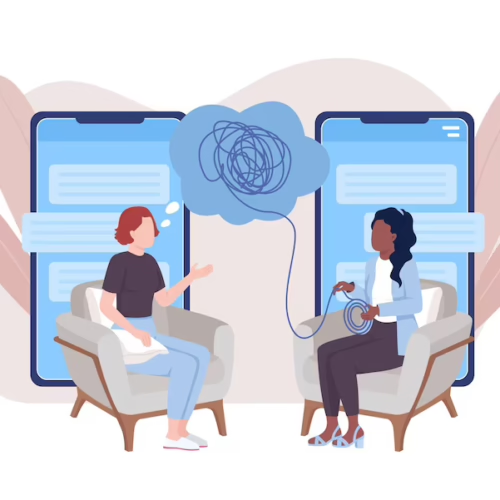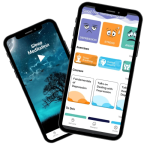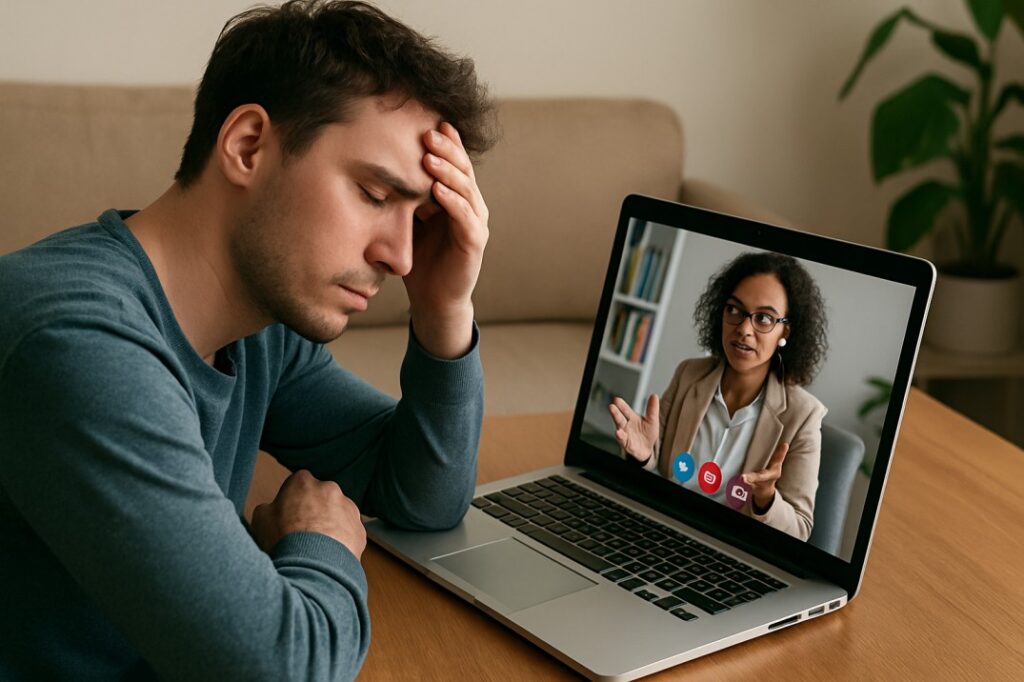Best Online Depression Counseling & Therapy | Top Therapists
- Setup a free & confidential chat on your depression issues
- Unlimited help through depression self-care app
- Live Video or Chat sessions with top depression therapists
Begin Therapy
Consult online with best Therapist
Get The Best Help For Depression
TherapyMantra is here to help you on your path to recovery from depression. We match you with the best depression therapists available 24/7 via video call or messaging.
Match with Depression Therapists
We assign the best counsellors experienced in depression issues based on your needs.
Affordable and Effective
Our online sessions are 90% less expensive than in-person therapy, available 24/7.
Self-Care for Depression
We offer ongoing depression support through self-care tools, depression help videos, chat groups, meditations, breathing exercises, and other resources.

Wondering If It’s Just A phase Or Something More? Take Our Free Online Depression Test To Find Out?
How It Works?
You are matched with a depression counsellor based on your needs and preferences. You get a secure “therapy room” where you can communicate with your counsellor via chat or phone. You can write or talk about depression & ask questions to deal with depression.

Register for Depression Counseling
Simply complete a 5-minute online form to tell us about your Depression issues

Consult with your Depression Therapist
We connect you with Depression counsellors who are available 24/7 based on your preferences and needs.

Connect to Our App
Apart from Video / chat sessions, our app offers self-care tools, videos and meditations to help you deal with your depression.
Top Depression Therapists
Get help from top-rated depression therapists at TherapyMantra. Our expert psychologists use positive conversations, guided exercises, and meditations to support your healing. Unlike traditional counseling, our online depression therapy offers 24/7 private chat with your matched therapist from a pool of 500+ professionals. Start your journey to better mental health today.
What is Depression?
Depression is a mental illness that affects how you feel. It may also have an effect on your body and mind. You may be sad or depressed, unable to engage in previously enjoyable activities, sleep excessively or insufficiently, and lack a desire to eat. If these symptoms occur frequently over a long period of time (at least two weeks), clinical depression may be the cause.
Most of us have heard the term “depression,” but only a few of us truly understand what it means. It is frequently misunderstood or mistaken for sadness, anxiety, phobia, or sadness.
Sadness, feeling down, and having no or little interest in daily activities are all symptoms that we all experience at some point in our lives. And if they last for a long time, they can lead to depression.
Types of Depression
Depression can be classified into several types.
- A major depressive disorder is the most common type of clinical depression. It happens when a person is depressed, loses interest in activities they used to enjoy, or both for at least two weeks in a row.
- Another type is persistent depressive disorder, which lasts more than two years and interferes with daily life functions.
- Seasonal affective disorder is a severe form of depression that occurs during the winter months. It’s a form that develops due to a lack of sunlight and usually disappears when spring arrives.
- Bipolar disorder is divided into major depressive and manic episodes, which are periods when you feel extremely happy and have little need for sleep to function.
- Depression can also be accompanied by a psychotic episode. This means you may experience hallucinations and delusions, both of which are symptoms of psychosis.
- Pregnancy and postpartum depression can occur after a woman has given birth. It occurs when pregnancy hormones alter mood-regulating neurotransmitters in your brain.
- Premenstrual dysphoric disorder (PMDD) is a more severe form of PMS (premenstrual syndrome). It is when you have symptoms like irritability, mood swings, and anxiety.
- When you can’t find a reason for your depression, you have situational depression. External events, such as the death of a close relative or financial difficulties, can trigger depressive symptoms.
- Atypical depression is a subtype of clinical depression. It occurs when you sleep and eat more than usual, gain weight, become irritable or tearful for no apparent reason, and have distorted self-perception.
- When you don’t respond to treatment or medications, you have Treatment-Resistant Depression.
Treatment Options For Depression
Therapy, meditation, medication are they key ways through which you can treat your depression:
Therapy
If you have depression symptoms that last for two weeks or longer, you should consider seeing a therapist who specialises in depression therapy. The majority of people who seek depression therapy report that when their symptoms began to interfere with their ability to function on a daily basis, they realised it was time to seek professional help.
Meditation & Mindfulness
Mindfulness activities and meditations that help with depression include loving-kindness meditation, mindfulness meditation, breath awareness meditation, transcendental meditation, visualisation, and body scan meditation.
Medication
Medication is an excellent treatment for depression. This has existed since the 1950s, and one type of it is known as SSRIs. They are used to treat anxiety, panic disorder, obsessive-compulsive disorder, social phobia, and premenstrual dysphoric disorder, also known as PMDD.
Antidepressants
Antidepressants work by altering brain chemicals known as neurotransmitters, which influence your mood. A neurotransmitter is a type of chemical that regulates sleep, appetite, and sexual desire. When people are depressed, their levels of chemicals are lower than they should be. When used as directed, SSRIs are not addictive. When taken over time, they have few side effects. As a result, if someone is unable to function without treatment, they can be used to treat depression.
How Can Therapy Help With Depression?
Depression isn’t something you can just get over; it’s a complex, potentially life-threatening condition caused by a variety of factors. Depression is rarely cured by a single treatment method, such as medication. While some people can manage their depression on their own, a therapist for depression near you can provide invaluable insights and a variety of innovative, personalised treatment options that often result in far better outcomes than their patients could achieve on their own.
Therapy can assist you in identifying what is causing your depression. Depression therapists use a variety of safe, noninvasive techniques to assist you in processing thoughts, feelings, and experiences that may be related to your symptoms. Physiological issues that can trigger depressive symptoms are also explored by therapists, and psychiatrists may prescribe antidepressant medications to be used in conjunction with talk therapy.
Therapy Options For Depression
1) CBT
One of the different types of psychotherapy. The type of therapy aims to change patterns in order to affect changes in moods and behaviours. CBT is a hybrid of bot, cognitive, and behavioural therapy. The therapist attempts to identify negative and unhealthy thought patterns and assists the patient in developing behavioural responses to difficult and stressful situations.
2) Counseling and psychoeducation
This is a very effective pharmacological treatment for depression and is considered the best for treating depression.
3) Expressive Arts Therapy
Art therapy, also known as creative expression therapy, can help you overcome depression. Art is a very potent and healing tool. Because it is a great form of expression, it is thought that creation can treat depression. One can express his or her thoughts, emotions, and ideas.
4) Dialectical Behavioral Therapy (DBT)
It is a variant of cognitive behavioural therapy. It also helps patients who are depressed, even if their behaviour is destructive. It is based on four skill modules, which are as follows:
- Mindfulness
- Tolerance for stress
- Emotional control
- Effective interpersonal communication.
5) Aspects of Acceptance and Commitment Therapy (ACT)
The therapy tries to understand an individual’s tendency and makes them realise the value and vitality of life. It does not simply try to change or eliminate unwanted and stressful thoughts and feelings. Rather, it attempts and teaches the formation of new and compassionate bonds through the same experiences.
How To Find A Depression Therapist?
TherapyMantra can help you find a depression therapist near you. We have over 500+ therapists listed on our therapist directory. You can follow the following steps to find a good depression therapist:
- First, ask your family doctor or anyone else you are seeing for a referral for depression therapist.
- The next thing you’ll want to do is ask your friends and loved ones for referrals.
- The next thing you’ll want to do is look online. There are many websites that help people find therapists in their area who can treat things like depression.
10,000+ Happy & Healed Depression Patients

“After years of dealing with personal and professional trauma issues, Therapy Mantra assisted me in releasing a lot of buried emotions. I had previously received counselling for this, which helped, but Therapy Mantra was able to turn me around and make me look forward to a better life. Wonderful!”
Kevin, 1 year on TherapyMantra
FAQs
You can get expert help for depression online at TherapyMantra. We connect you with trained therapists who offer personalized support through private chats, video calls, and guided tools—all from the comfort of your home.
TherapyMantra is one of the top providers of online depression counseling, with a network of 500+ licensed therapists. We offer 24/7 support, personalized matching, and private sessions designed for lasting emotional wellness.
TherapyMantra has a large pool of licensed depression therapists, counselors, and mental health professionals who specialize in treating depression with evidence-based methods.
Yes! TherapyMantra provides a free trial session so you can experience how online therapy works and decide if it’s the right fit for you.
Absolutely. If you feel your therapist isn’t the right match, you can request to switch anytime. Your comfort and progress are our top priorities.
With TherapyMantra, you get 24/7 access, private chat, flexible scheduling, and a choice from 500+ therapists—all online. It’s more convenient, affordable, and accessible than traditional face-to-face therapy.







